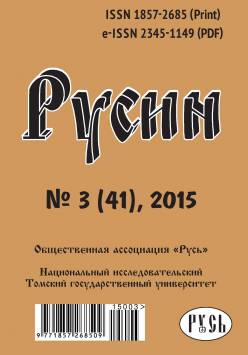The names of rusin holidays as the evidence of linguistic and ethno-cultural specificity of the nation
The article analyses the names of Rusin holidays - secular (gulya'tika,zabava) and religious (Vodo'shchi, syachanky); the former are connected with the birth (urodi'ny christening (krest), wedding (gusky, sva'lba, svashchinfy funeral (koma'shnya, sorokovina) and labour activities of the person (dozhinky, miishanya, prya'hy), the latter - with the events of the Sacred history (Veikden', Zdvigy These words are considered bright culturally marked signs reflecting the values of the ethnos and are closely connected with the history of its development and formation of worldview and beliefs. The Rusin holiday names demonstrate the well-developed synonymy formed largely under the influence of the extra-linguistic factors, the most important of which was the living conditions of the people. Thus, the natural territorial isolation of the Carpathian Rusins contributed to the preservation of archaic festive rituals and/or their names (lopatky', o'tpust, Kerechun), with the latter including regional lexical units (Grumniitsi, haba'tnya). In its turn, the multicultural environment enhanced by a wide dispersal of people in a number of countries and the interruption of Orthodox tradition for the part of the Rusin ethnic group ensured the inflow of borrowings from related (Ruzdvo) and unrelated languages (A'dvent). The most overt trace was left by Hungarian (dinomda'nom,bogrejdovanya) and German (fashingyy),which indicates that in the past the Rusin territories were part of the Austro-Hungarian Empire.
Keywords
этнолингвистика,
русинистика,
названия праздников,
ethnolinguistics,
Rusin studies,
the names of holidaysAuthors
| Starikova Galina | Tomsk State University | gstarikova@yandex.ru |
Всего: 1
References
Гуцульск говiрки. Короткий словник / Вщ. ред. Я. Закревська. Львiв, 1997. 232 с.
Гиндин Л.А., Калужская И.А. Славистические аспекты карпатского языкознания // Славистика. Индоевропеистика. Нос-тратика. М.: Институт славяноведения и балканистики, 1991. С. 187-188.
Даль В.И. Толковый словарь живого великорусского языка. М., 1955. Т. 4. 683 с.
Жайворонок В.В. Знаки украУнськоУ етнокультури: Словник-довщник. КиУв: Довiрa, 2006.
Касторский М. Начертание славянской мифологии. СПб., 1841. 183 с.
Керча И. Русинско-русский словарь. Ужгород: Пол^ршт, 2007. Т. 1. 608 с.
Керча И. Русинско-русский словарь. Ужгород: Пол^ршт, 2007. Т. 2. 608 с.
Керча И. Русско-русинский словарь. Ужгород: Пол^ршт, 2012. Т. 1. 580 с.
Керча И. Русско-русинский словарь. Ужгород: Пол^ршт, 2012. Т. 2. 596 с.
Народный подкарпатский календарь на 1908 г.: В пользу и употребление греко-кат.[олического] русского народа / Сост. о. Эмилий А. Кубек. Унгвар, 1907. 198 с.
Плотникова А.А. Этнолингвистическая география Южной Славии. М.: Индрик, 2004. 768 с.
Подкарпатский календарь с типиком на год 1897. В пользу и употребление подкарпатского греко-кат.[олического] угро-русского народа / Сост. В. ^гер. Унгвар, 1896. 166 с.
Моргунова О.В., Кривощапова Ю.А., Осипова К.В. Русский народный календарь. Этнолингвистический словарь / Науч. ред. Е.Л. Березович. М.: Аст-Пресс Книга, 2015. 544 с.
Словарь русского языка XI-XVII вв. М.: Наука, 1992. Вып. 18. 290 с.
Словарь русского языка XI-XVII вв. М.: Наука, 1996. Вып. 23. 253 с.
ТерентьеваЕ.Ю. Народные названия церковных праздников в русской и болгарской православной традиции. Автореф. дис..канд. филол. наук. М., 2012. 22 с.
Толстая С.М. Месяцы // Славянские древности. Этнолингвистический словарь. М.: Международные отношения, 2004. Т. 3. С. 236-241.
Толстая С.М. Праздник // Славянские древности. Этнолингвистический словарь. М.: Международные отношения, 2009. Т. 4. С. 237-240.
Топоров В.Н. Праздник // Мифы народов мира: Энциклопедия. М., 1982. Т. 2. С. 329-331.
Черных П.Я. Историко-этимологический словарь современного русского языка. М.: Рус. яз., 1999. Т. 2. 560 с.
Чеснокова П. Геортонимы: тенденции развития, сферы влияния // Известия ВГПУ. 2011. Вып. № 2, т. 56. С. 46-50.
Чёха О.В. Названия месяцев в новогреческом народном календаре // Этнолингвистика. Ономастика. Этимология: Материалы III Междунар. науч. конф. : Екатеринбург, 7-11 сентября 2015. Екатеринбург: УрГУ, 2015. С. 298-300.
Шангина И.И. Русский народ. Будни и праздники: Энциклопедия. СПб.: Азбука-классика, 2003. 560 с.
Шемякин Я.Г. Праздник как историко-культурный феномен: мир идеала и реальность власти. URL: https://mipt.ru/education/chair/liberal_arts/ courses/ history/shemyakin_new.php (дата обращения: 3.09.2015).
Энциклопедический словарь / Изд. Ф.А. Брокгауз, И.А. Ефрон. СПб.: типолитография И.А. Ефрона, 1895. Т. 30. С. 479-960.
Этимолопчний словник укра'шско! мови. Кшв: Наукова думка, 1996. Т. 2. 570 с.
_9_2016_1476371722.jpg)
